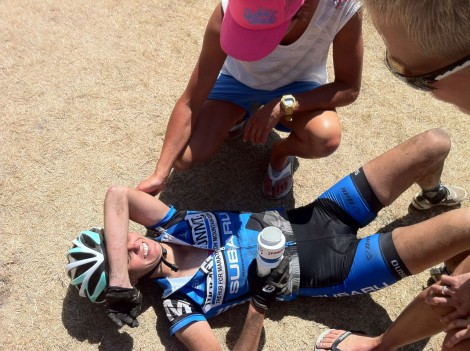Failure is still taboo, but if we dared talk about it a little more, maybe we’d fear it a little less.
I recently posted a few comments on Facebook about a race that didn’t go so well and was really grateful for the supportive and encouraging comments from my friends, but I also felt guilty. I hadn’t quite said the F word, but it was evident that I felt that I’d failed. After all, I’d set a reasonable goal, worked towards it, felt confident in my ability to achieve it, made a race plan and stuck to it, and then not been able to do what I thought I could. There were no mitigating factors either – my fitness and technical skill just weren’t good enough.
In my book that’s failure, but in a society whose phrasebook is written by Oprah, in a system where everyone gets a prize and we should always look on the bright side, in a country where our standard of living is so high that expressing disappointment of any kind uncovers great social unease at the unfairness of our luck, first world problems like stuffing up a mountain bike race have become just another kind of problem. A guilt stick to beat ourselves with. Talking about failure is taboo. I still feel terrible for even going near the topic, but now I can’t leave it alone.
Because, I think, our anxiety about maintaining a satisfied façade is perhaps more a source of unhappiness than whatever is making us question our state of mind in the first place. How much more afraid of failure are we knowing that we are not supposed to express sadness, envy, frustration, or anger if we don’t achieve what we set out to do?
In the week leading up to this race I was a mess. I couldn’t eat properly, sleep properly or talk about anything else. I played it over and over in my mind. I woke in the night obsessing about how I’d get through the tougher technical elements. I was terrified, terrified of coming last, of making a fool of myself, riding alone on the track: looked at, laughed at, ridiculous, a failure.
I sometimes look like this after a successful race
It was an achievement just to get to the start line. And I did come last. As I left the track I grabbed some water and rode my bike right up to the top of the main fire road at the event centre, alone in the trees, surrounded by yellow flowers and grasshoppers, and felt – nothing much at all. None of the self-loathing and worthlessness I’d anticipated, just disappointed. I didn’t cry, I didn’t throw a tantrum, but I was unhappy with my performance. I left the event just as motivated and in love with mountain bike racing as ever, and in the weeks since have done some excellent training for the next block of races.
Just loving riding can be the biggest assistance for training.
We need to untangle how we value ourselves from what we achieve. Once that’s done, failure becomes less terrifying. In psychology one of the chief methods for treating anxiety and phobias is exposure therapy. The name says it all. Basically you go and do the thing that terrifies you, whether it be getting on an airplane or driving through a tunnel, and it works very well.
So the other weekend I learnt a lot about what I can do better in a bike race, but I also gained some valuable exposure to something that terrifies me: failure. And guess what – as my next race approaches I am not haunted like I was before. I failed, and nobody ceased to be my friend, my family still love me just the same, my pay wasn’t cut. My personal value was not affected.
Acceptance is an important skill for surviving our emotions, and what I think happens when we try to turn failure into personal growth, into learning experiences and temporary setbacks on the path to greatness, is that we actually do a little semantic tap dance around our feelings, and fail to acknowledge all the negative emotions we judge ourselves so harshly for having. Acceptance can be much less taxing than trying to keep these monsters at bay.
Over just one event I’ve known crippling fear of failure and true failure and I can tell you one thing for sure. The fear was more intense, more pervasive, more debilitating and more miserable than the failure itself. Dealing with the failure was just a matter of acceptance, where fear of failure sent me mad trying to do everything but accept failure as a possibility.
I’m not here to tell you that you’ll learn more from failure than from success, or that you’ll build character when you’re off the pace: That’s entirely up to you. But I will say that no matter what, you are not what you achieve, who you beat, or where you stand on a podium. Take my advice and have a go, because that’s who you are.
Follow @imogenjsmith

